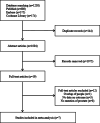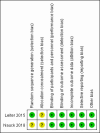Incretin-based drugs decrease the incidence of prostate cancer in type 2 diabetics: A pooling-up analysis
- PMID: 38758855
- PMCID: PMC11098233
- DOI: 10.1097/MD.0000000000038018
Incretin-based drugs decrease the incidence of prostate cancer in type 2 diabetics: A pooling-up analysis
Abstract
Incretin-based drugs, a class of Antidiabetic medications (ADMs) used in the treatment of type 2 diabetes, may affect the incidence of prostate cancer (PCa). But real-world evidence for this possible effect is lacking. Therefore, the aim of this study is to assess the effect of incretin-based drugs on the incidence of PCa, including glucagon-like peptide-1 (GLP-1) receptor agonists and dipeptidyl peptidase-4 (DPP-4) inhibitors. We searched PubMed, Embase, and Cochrane Library databases for eligible studies through September 2023. Two independent reviewers performed screening and data extraction. We used the Cochrane Handbook for Systematic Reviews and the Newcastle-Ottawa Scale (NOS) to assess the quality of included randomized controlled trials (RCTs) and cohort studies. We did a meta-analysis of available trial data to calculate overall risk ratios (RRs) for PCa. A total of 1238 articles were identified in our search. After screening for eligibility, 7 high-quality studies met the criteria for meta-analysis, including 2 RCTs and 5 cohort studies, with a total of 1165,738 patients. Compared with the control group, we found that incretin-based drugs reduced the relative risk of PCa by 35% (95% confidence interval (CI), 0.17-0.49; P = .0006). In subgroup analysis, the RR values for GLP-1 receptor agonists and DPP-4 inhibitors were 62% (95% CI, 0.45-0.85; P = .003) and 72% (95% CI, 0.46-1.12; P = .14), respectively. Incretin-based drugs are associated with lower incidence of prostate cancer and may have a preventive effect on prostate cancer in patients with type 2 diabetes.
Copyright © 2024 the Author(s). Published by Wolters Kluwer Health, Inc.
Conflict of interest statement
The authors have no funding and conflicts of interest to disclose.
Figures







Similar articles
-
Incretin-Based Drugs and the Incidence of Prostate Cancer Among Patients With Type 2 Diabetes.Epidemiology. 2022 Jul 1;33(4):563-571. doi: 10.1097/EDE.0000000000001486. Epub 2022 Mar 29. Epidemiology. 2022. PMID: 35394977
-
Incretin-based therapies for type 2 diabetes mellitus: a review of direct comparisons of efficacy, safety and patient satisfaction.Int J Clin Pharm. 2013 Apr;35(2):159-72. doi: 10.1007/s11096-012-9729-9. Epub 2012 Dec 22. Int J Clin Pharm. 2013. PMID: 23263796 Review.
-
Risk of heart failure hospitalization among users of dipeptidyl peptidase-4 inhibitors compared to glucagon-like peptide-1 receptor agonists.Cardiovasc Diabetol. 2018 Jul 17;17(1):102. doi: 10.1186/s12933-018-0746-4. Cardiovasc Diabetol. 2018. PMID: 30016946 Free PMC article.
-
Incretin-based agents in type 2 diabetic patients at cardiovascular risk: compare the effect of GLP-1 agonists and DPP-4 inhibitors on cardiovascular and pancreatic outcomes.Cardiovasc Diabetol. 2017 Mar 1;16(1):31. doi: 10.1186/s12933-017-0512-z. Cardiovasc Diabetol. 2017. PMID: 28249585 Free PMC article.
-
The effects of dipeptidyl peptidase-4 inhibitors and glucagon-like peptide 1 receptor agonists on cognitive functions in adults with type 2 diabetes mellitus: a systematic review and meta-analysis.Acta Diabetol. 2020 Oct;57(10):1129-1144. doi: 10.1007/s00592-020-01529-1. Epub 2020 Apr 16. Acta Diabetol. 2020. PMID: 32300876
Cited by
-
Differential Effects of GLP-1 Receptor Agonists on Cancer Risk in Obesity: A Nationwide Analysis of 1.1 Million Patients.Cancers (Basel). 2024 Dec 30;17(1):78. doi: 10.3390/cancers17010078. Cancers (Basel). 2024. PMID: 39796706 Free PMC article.
-
Effect of GLP-1 receptor agonists on prostate cancer risk reduction: a systematic review and meta-analysis.Int Urol Nephrol. 2025 Apr;57(4):1039-1049. doi: 10.1007/s11255-024-04266-4. Epub 2024 Nov 4. Int Urol Nephrol. 2025. PMID: 39495435
-
Targeting obesity, metabolic syndrome, and prostate cancer: GLP-1 agonists as emerging therapeutic agents.Discov Oncol. 2025 Mar 1;16(1):258. doi: 10.1007/s12672-025-01878-9. Discov Oncol. 2025. PMID: 40024963 Free PMC article. Review.
References
Publication types
MeSH terms
LinkOut - more resources
Full Text Sources
Medical
Miscellaneous

